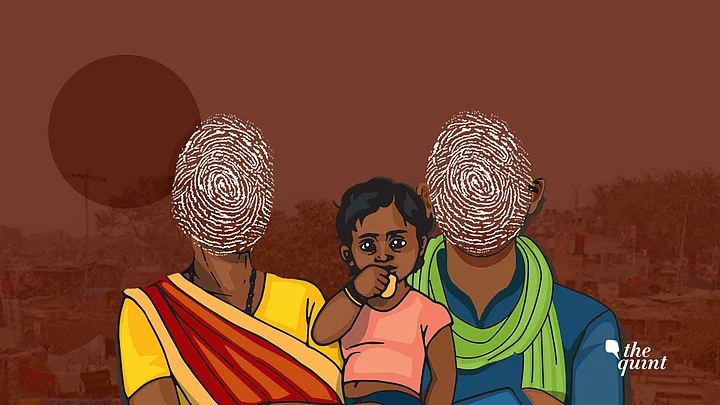Even as the Supreme Court continues to hear petitions against making Aadhaar mandatory, with several alleged instances of misuse of data, a public hearing conducted by the Delhi Rozi Roti Adhikar Abhiyan and Satark Nagrik Sangathan at the Gandhi Peace Foundation in Delhi on 5 February, brought forth the problems being faced by the elderly and those living in slums.
Residents from various localities of Delhi shared their woes on how they were denied ration due to authentication failure at various ration shops. Around 72 lakh people in Delhi are entitled to a monthly quota of ration under the National Food Security Act (2013). While those with ‘Priority’ ration cards are entitled to 5 kilograms food grains per person, families with Antyodaya ration cards are provided 35 kilograms food grains per month.
Data compiled by the Satark Nagrik Sangathan shows that there were 31,199 cases of failure of biometric authentication at Fair Price Shops across Delhi.
Objective Behind the Public Hearing
The public hearing was an attempt by a group of activists to understand the issues being faced by the people ever since Aadhaar-based authentication was made mandatory in Delhi since January this year.
Testimonies from the public hearing will be part of evidence submitted in the Delhi High Court that is hearing a case challenging the Centre’s notification making Aadhaar mandatory for the disbursal of food grains. The next hearing in the case is expected to take place on 16 February.
The public hearing was attended by around 400 people who are residents of slums in Delhi, namely Kusumpur Pahari, Motilal Nehru camp in Munirka, Geeta Ghar shelter, Jagmdamba camp and Lal Gumbad camp.
Authentication Failed Yet Records Show Food Grains Were Distributed
Phoolmati, resident of a slum in south Delhi, began the hearing by saying that when she went to the ration shop in the month of January this year, she had to wait for an hour and was told that the server was down. When Phoolmati went for the second time, the biometric machine refused to recognise her son’s thumb impression. Five members from her family have been listed on the ration card, which ensures monthly quota of 25 kg food grains.
When Phoolmati approached the ration shop on 16 January for the fourth time, she was told by the concerned officer that the monthly quota of ration had already been disbursed, with the database indicating ‘zero balance’ for the month of January. She filed a complaint with the circle officer in Katwariya Sarai but didn’t get a satisfactory reply from the official.
Treatment Denied to an HIV-Positive Man
Govind, who’s HIV positive and lives at Geeta Ghat shelter in Yamuna Pushta, shared his ordeal on how Delhi’s Lok Nayak Hospital had stopped treatment two years ago since he didn’t have an Aadhaar card. He finally managed to get one just so that he can avail treatment at the government hospital.
In 2016, the National AIDS Control Organisation (NACO) had issued an order to link the Anti-Retroviral Therapy (ART) treatment with Aadhaar, raising concerns about privacy of those suffering from AIDS, who anyway often face stigma of a certain kind.
Aadhaar Can’t Prevent Pilferage of Food Grains
Sona Devi, a widow, is a resident of New Seelampur and stays alone. She is entitled to a monthly quota of 25 kg wheat, 10 kg rice, and 6 kg sugar as per the Antyodaya Anna Yojana scheme that caters to the poorest of the poor. In Delhi, the scheme has as many as 56,249 families listed as beneficiaries.
But when Sona Devi approached the ration shop in January this year, the shopkeeper gave her 20 kg wheat and 5 kg rice. Surprisingly, this anomaly is not reflected in the online database of the Fair Price Shop (FPS) that shows ‘zero balance’ for the month of January.
Fingerprints Didn’t Match at the Ration Shop
Sixty-year-old Samo Devi is a resident of the Kusumpur Pahari slum and has a ration card under her name. In January this year, she couldn’t receive the monthly quota of grains as her fingerprint didn’t match with the registered biometric data. Here again, the online database doesn’t reflect authentication failure for the month of January.
Family of Seven Denied Food Grains But Records Show Otherwise
Uma Shankar, another resident of the Kusumpur Pahari slum, has seven members of his family listed on the ration card. This entitles them to a monthly quota of 35 kg food grains. In January this year, Shankar’s family was denied their quota due to authentication failure, as the fingerprints of his family didn’t match with the registered biometric data. However, the receipt from the Fair Price Shop shows ‘zero balance’ for the month of January, which means that someone else has been given grains on behalf of Shankar’s family.
Activists Caution the Delhi Govt
Activists claim that genuine ration card holders are being denied food grains due to glaring loopholes, such as authentication failure and the inability of the software to prevent pilferage of foodgrains. “If you want to curb corruption then one needs to put in place a proper grievance redressal mechanism,” says Amrita Johri, an RTI activist associated with the Satark Nagrik Sangathan.
Citing example of 11-year-old Santoshi Kumari from Jharkhand who died of starvation in October last year after her family was denied ration due to non-availability of Aadhaar, activists suggest that the government’s move will harm the interests of certain vulnerable sections of society.
Johri told The Quint that a copy of these testimonies will be sent to the Delhi government and the Food Minister as well, urging the concerned authorities to take necessary action and make sure that nobody is denied food grains for want of an Aadhaar card.
